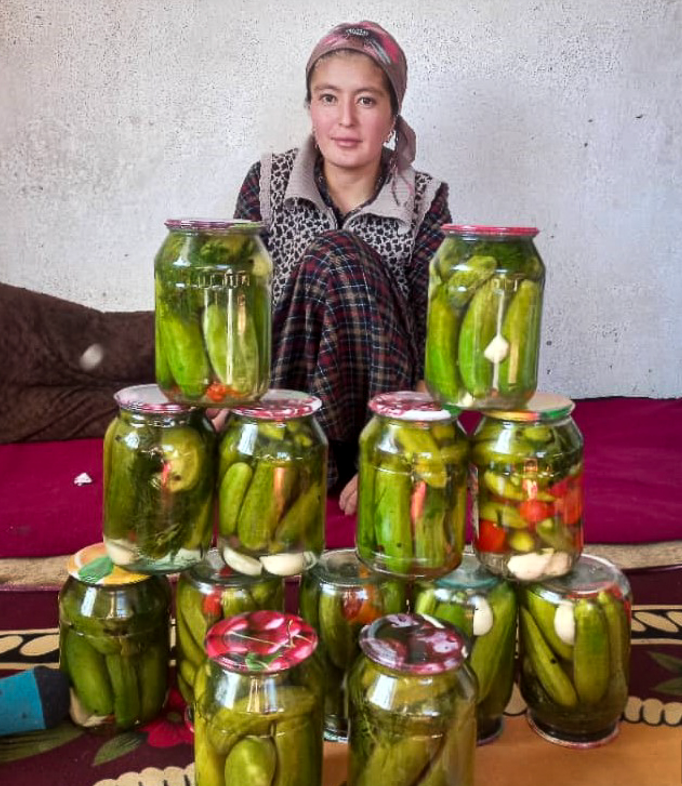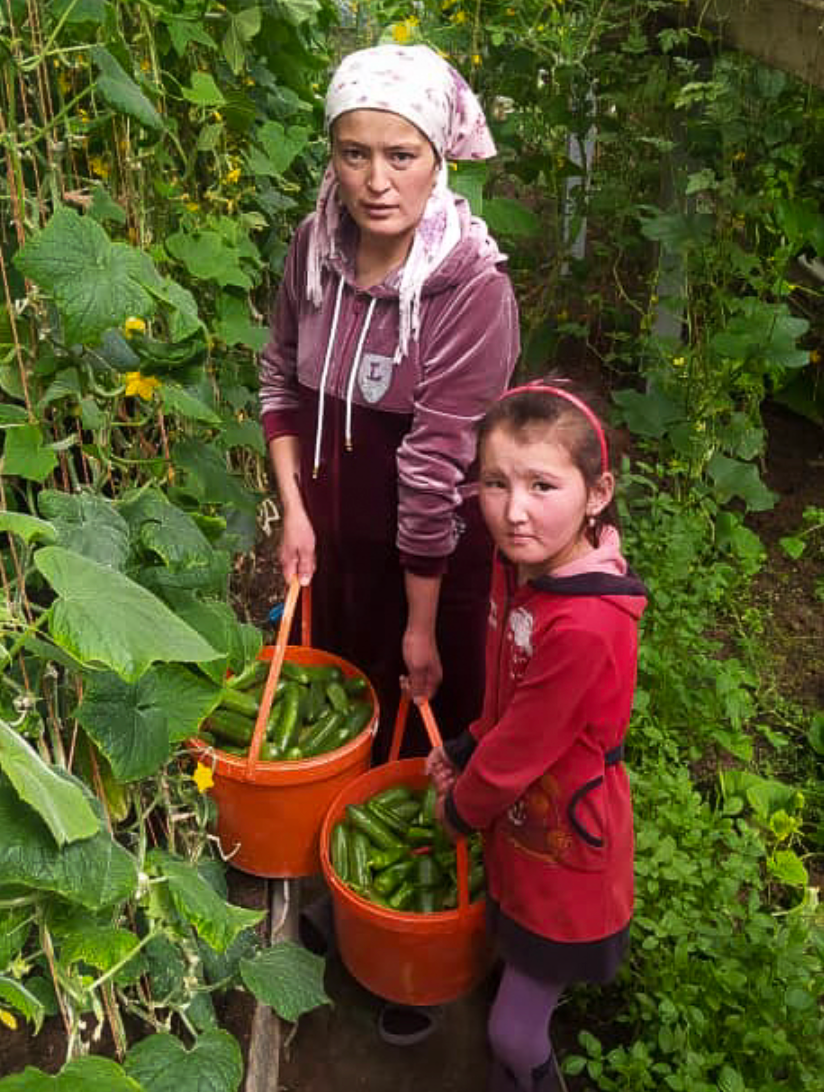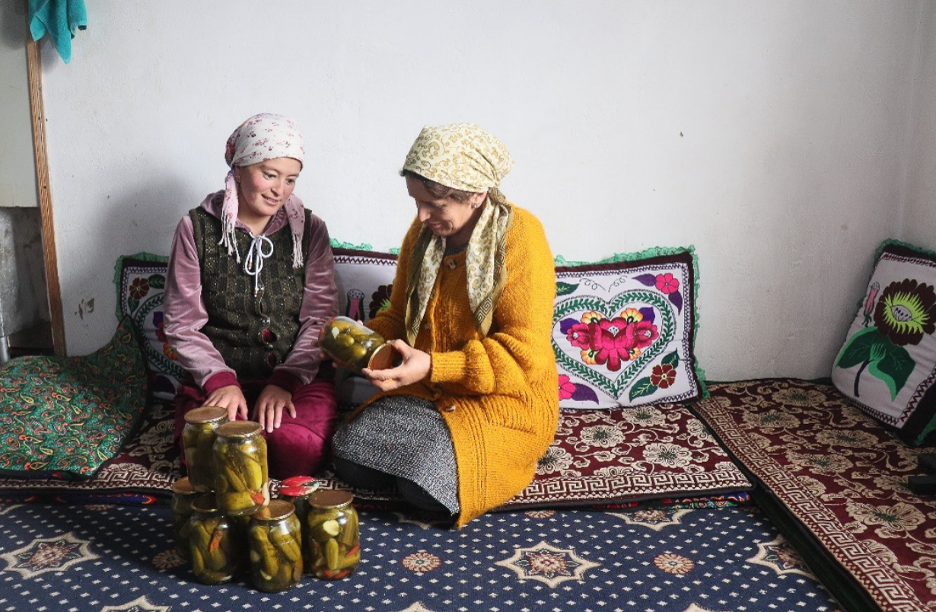Through AKF and USAID’s Local Impact project, rural women in Tajikistan are taking the lead in providing food security to their communities


In the most remote regions of Tajikistan, the main livelihood is livestock breeding. Harsh winter conditions make farming in the winter almost impossible, and as a result, the community there suffers from a deficiency of essential plant-based vitamins, which especially impacts the health of women and children.
Some local vegetable markets exists, but fresh produce is costly and unfortunately an unaffordable luxury for most families.

Sitting almost 11,000 feet above sea level, Tajikistan’s Murghab district grapples with an unforgiving climate. The arid and mountainous landscape with winter temperatures as low as -11°F make vegetable cultivation almost impossible.
Sapargul, a local resident, has emerged as a beacon of hope in this remote community. She produces healthy vegetables in the shelter of a climate-smart greenhouse at a price her community can afford to pay.
She uses an innovatively designed greenhouse to grow organic vegetables, defying the winter high winds and bitter temperatures of her village to provide a year-round source of fresh produce.
The greenhouse, located in Murghab, is shaped like a tunnel to withstand strong winds and is covered with polyethylene and semi-carbonate to keep it warm. Sapargul also uses cold and disease-resistant seeds to further bolster the resilience of her produce.
Sapargul, originally from Tajikistan’s Lakhsh district, moved to Murghab after she married and quickly discovered that the much harsher climate was having a major impact on the local community.
“I noticed that my children, as well as others, were suffering from a lack of vitamins. My husband and I decided to establish a greenhouse, so that we could all be healthier,” she says.
Having previously farmed in Lakhsh, Sapargul quickly realized that cultivating crops in her new home with an altitude of almost 11,000 feet, was going to be much more difficult.

Sapargul pickles cucumbers to preserve and sell

Sapargul’s daughter helping out with a harvest
“I noticed that my children, as well as others, were suffering from a lack of vitamins. My husband and I decided to establish a greenhouse, so that we could all be healthier,” Sapargul says.
Sapargul considered building a greenhouse, substantial enough for the climate, but then found the investment required created an even bigger hurdle than the weather. She tried improvising using a structure made from polyethylene plastic, but it was not strong enough.
Then came the breakthrough – Sapargul heard about a new program for building greenhouses funded by USAID through the Aga Khan Foundation’s Local Impact project The project’s goal was to enhance nutrition in Tajikistan’s remote communities and boost incomes. She submitted her application detailing her proven farming experience.
Sapargul was chosen as one of the top applicants, which marked the beginning of a journey that would change her life and her community’s health.
In 2022, she began operating her climate-smart greenhouse and quickly “started to earn some money from the sale of vegetables I grew there,” she says. “It makes me very happy to contribute to my family’s income.”

She now grows organic cucumbers, cabbages, tomatoes, and more. From April to September 2023, Sapargul’s greenhouse produced 284kg of cucumbers, 292 bundles of greens, and 138kg of tomatoes. In total, Sapargul earned TJS 4,445 (around $400 USD) during this period.
Sapargul keeps some of the vegetables for her family, sells some to the local market, pickles some for preservation, and gives the rest to her neighbors, free of charge. Her harvests serve more than 1,700 local households, creating three jobs and benefiting more than 6,700 people.
Sapargul sells her produce to her community, providing jobs for her neighbors and improving nutrition throughout her village.
Through this initiative, AKF plans to support more farmers like Sapargul in enhancing their organic produce cultivation, increasing the variety of vegetables, and elevating the quality of their harvests.
In Murghab, this greenhouse transcends the simple provision of food. It’s primarily about empowering women like Sapargul and equipping them with the tools and opportunities needed to create a better life for themselves and their community.
Sapargul’s success story is a testament to her determination, even in the harshest of conditions. In this remote corner of the world, a brighter future is emerging, thanks to a greenhouse filled with hope and fresh, healthy produce.
Written by Firuzai Muzaffar and Anzurat Akobirshoeva
Local Impact is a $150m multi-year, multi-sector, and multi-country global partnership between AKF and USAID for meaningful, sustained impact across Asia and Africa. It is a five-year Leader with Associates (LWA) cooperative agreement that allows USAID to work with AKF and its partners to design and implement projects that address development challenges across sectors. Drawing on human-centered design tools and processes, Local Impact will spark new, innovative solutions to complex problems while tapping into existing productive efforts to address these issues at the grassroots level.